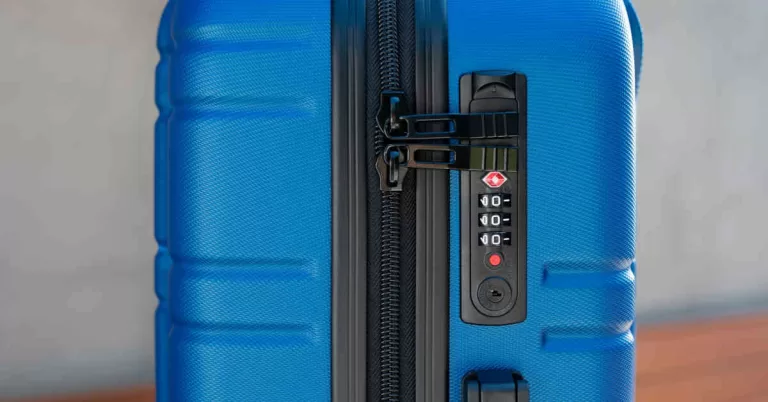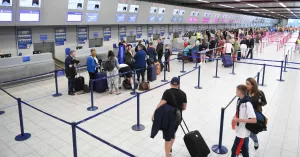If you’re planning to travel with checked luggage, you might be wondering if you should lock it or not. After all, you don’t want your belongings to be lost, stolen, or damaged while they’re out of your sight. But locking your luggage also comes with some risks and limitations.
In this post, we’ll explore the pros and cons of locking your checked luggage and give you some tips on how to do it safely and effectively.
Benefits of Locking Your Checked Luggage
Locking your bag can provide several benefits and reasons to secure your belongings during air travel. Here are some key reasons why you should consider locking your bag:
Can Act as a Deterrent
A locked bag acts as a visual deterrent to potential thieves. It sends a message that your bag is secured and may discourage opportunistic theft, as it creates an additional obstacle for someone trying to access your belongings quickly.
Protection Against Opportunistic Theft
Locking your bag adds an extra layer of security, reducing the risk of theft. It makes it more challenging for unauthorized individuals to open your bag and pilfer your belongings. While it may not completely eliminate the possibility of theft, it can discourage casual theft attempts.
Visual Alert That Your Luggage Has Been Opened
A locked bag can serve as a visual sign that the bag has been tampered with, making it easier to notice if someone has attempted unauthorized access.
Of course, security personnel may have opened your luggage, such as a TSA agent. In this instance, a note will be left inside your luggage, advising that your bag has been inspected.
Peace of Mind
Knowing that your bag is locked can provide peace of mind throughout your journey. It allows you to travel with less worry about the security of your possessions and enables you to focus on enjoying your trip.
Personal Items Security
If you have valuable or sensitive items in your checked bag, such as electronics, jewelry, important documents, or medication, locking your bag adds an extra level of protection. It gives you reassurance that these items are less vulnerable to theft or unauthorized handling.
However, we strongly advise that you should pack these types of items in your carry-on bag.
Prevention of Accidental Opening
A locked bag can prevent accidental opening due to zipper malfunction or rough handling during transit, reducing the risk of items falling out or getting damaged.
Drawbacks of Locking Your Checked Luggage
While there are valid reasons for locking your bag, it’s important to consider the potential drawbacks and reasons why some travelers may choose not to lock their checked bags. Here are some reasons why you might decide against locking your bag:
Baggage Inspection
Security officials may need to inspect your bag for various reasons, such as random screening, suspicious item detection, or compliance with aviation regulations. If your bag is locked, they may need to cut or break the lock to access its contents. This can result in potential damage to your lock or even your bag itself.
Lock Damage or Malfunction
Luggage locks, especially those of lower quality, can be susceptible to damage or malfunction due to rough handling during baggage handling processes. There is a possibility that the lock might break, rendering it ineffective or even making it difficult to open your bag upon arrival.
Baggage Handling Regulations
Some airlines or airports have specific regulations or policies regarding locked bags. For instance, certain countries may require bags to be left unlocked for security reasons or to facilitate customs inspections. In fact, many U.S. airlines, such as Southwest, suggest that you should not lock your checked bags.
It’s important to familiarize yourself with the regulations of your specific destination and airline.
Visual Inspection and Identification
In some cases, security officials may need to visually inspect the contents of your bag without physically opening it. If your bag is locked, they might request you to unlock it or ask additional questions, which can prolong the security process.
Alternative Security Measures
Instead of relying solely on locks, there are other security measures available, such as plastic wrapping services at airports or the use of tamper-evident seals, that provide visual indicators of tampering without the need for locks.
How to Lock Your Checked Bag?
If you decide to lock your checked bag, you need to follow some guidelines to avoid any problems or delays at the airport. Here are some tips on how to lock your checked bag:
Use a TSA-Approved Lock
The TSA has master keys that allow them to open any TSA-approved lock if they need to inspect your bag. If you use a non-TSA lock, they will simply cut it off your bag, which could damage your luggage or delay your flight.
You can find TSA-approved locks at most travel stores or online retailers. They come in different shapes and sizes, such as combination locks, keyed locks, or built-in locks.
TSA-approved locks can be opened by the TSA throughout the U.S. and U.S. territories, However, if you’re traveling internationally, this may not be the case (pun not intended).
For your reference, we have included a list of countries that can and can’t open TSA-approved locks. This list is current at the time of writing. To search for a specific country, you can visit Travel Sentry’s website.
What is Travel Sentry?
Travel Sentry is a company that makes standards for luggage locks that can be opened by security agencies like the TSA and CATSA. They have special tools and codes to open and re-lock the locks. The locks have a red diamond logo and a code from TSA001 to TSA008. It’s used in most airports in the world.
Please note that these lists aren’t exhaustive.
Countries That Can Open TSA Locks
- Australia
- Austria
- Belgium
- Canada
- China
- Czech Republic
- Denmark
- Finland
- France
- Germany
- Greece
- Hungary
- Ireland
- Israel
- Italy
- Japan
- Korea
- Luxembourg
- Netherlands
- New Zealand
- Norway
- Poland
- Portugal
- Spain
- Sweden
- Switzerland
- Taiwan
- United Kingdom
Countries That Can’t Open TSA Locks
- Egypt
- India
- Indonesia
- Malaysia
- Singapore
- South Africa
- Thailand
- Vietnam
Don’t Pack Valuables in Your Checked Bag
Even if you use a TSA-approved lock, there’s no guarantee that your bag won’t be lost, stolen, or damaged while it’s in transit. The TSA and the airline are unlikely to reimburse you for any losses or damage that occur to your checked luggage. That’s why you should always keep any valuables, such as jewelry, electronics, documents, medications, etc., in your carry-on bag or on your person.
Label Your Bag Properly
Make sure your bag has a clear and durable luggage tag with your name and contact information on it. This will help identify your bag if it gets lost or misplaced.
You can also add some distinctive features to your bag, such as stickers, ribbons, or straps, to make it stand out from other bags and prevent someone from grabbing it by mistake.
What Are the Alternatives to Locking Your Checked Luggage?
If you’re not comfortable with locking your checked bag, or if you don’t have a TSA-approved lock handy, there are some alternatives that you can consider:
Use a Luggage Strap
A luggage strap is a belt-like device that wraps around your suitcase and secures it with a buckle or a clasp. It can help keep your zippers from opening accidentally and add some extra protection to your bag.
However, it won’t stop someone from cutting through it or opening it with a tool.
Use Luggage Wrapping Services
Plastic wrapping is a service that wraps your entire suitcase in a layer of plastic film. It can help protect your bag from scratches, dirt, water, and tampering.
However, it won’t stop someone from cutting through it. It also costs extra money and creates more waste.
Use a Luggage Cover
A luggage cover is a fabric sleeve that fits over your suitcase and zips up. It can help protect your bag from scratches, dirt, water, and tampering.
However, it won’t stop someone from cutting through it. It also adds some extra weight and bulk to your bag.
Final Thoughts
Locking your checked bag is a personal choice that depends on several factors, such as how much you trust the airline and the TSA, how valuable the items in your bag are, how much hassle you’re willing to deal with at the airport, etc.
There are pros and cons to locking your checked luggage, as well as alternatives that you can consider.
Personally, as mentioned in my post about luggage locks, I don’t lock my checked bags before handing them over to the airline at check-in. However, I do keep my luggage locked at all other times, such as at a hotel or on public transport.
Ultimately, the best way to ensure the safety of your belongings is to pack smart, travel light, and keep your valuables with you at all times.
Sources



